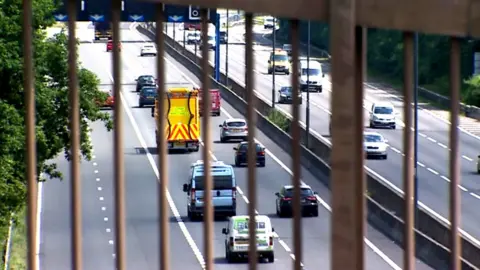M4 relief road: UK ministers 'could bypass Welsh Government'
The UK government would never "rule anything out" on bypassing the Welsh Government to build an M4 relief road, the Welsh secretary has told BBC Wales.
Simon Hart said UK ministers would "much prefer" a "collaborative project" to tackle congestion around Newport and the Brynglas tunnels.
He added that while they "probably could" bypass Welsh ministers it would be "complicated" and "controversial".
The Welsh Government said the relief road was a matter for Wales.
Wales' First Minister Mark Drakeford scrapped a relief road plan last year after declaring a climate emergency.
The recently published UK Internal Market Bill, if passed into law, will give the UK government power to spend on otherwise devolved areas such as infrastructure and economic development.
Speaking to the BBC Politics Wales programme, Mr Hart said that if the UK government could "find a way" of building the M4 relief road it would.
He said he did not want to bypass the Welsh Government, but added: "There are ways in which I suspect we probably could, it would be complicated, controversial, it would require years probably of legal wrangling.
"We would much prefer the Welsh Government to come to the table, look at this as a collaborative project.
"But until we get to that point, I'm afraid there's not just a blockage at Brynglas, there's a blockage in Cardiff as well."
When asked whether new powers granted through the UK Internal Market Bill would allow UK ministers to bypass the Welsh Government if they could not get them on board, Mr Hart said: "We never rule anything in, or rule anything out."

But he said these new powers were "not there to try and put Welsh Government in a difficult position" but to "enhance what we all want to do which is job creation and investment in Wales".
The Welsh Government said a decision had "already been made" regarding the relief road.
It added: "We remain committed to tackling congestion with solutions that recognise the unprecedented challenge of climate change as well as the financial pressures caused by ten years of austerity and capital budget cuts."
How could this be funded?
Mr Hart said the UK government had "already ruled out" using money provided to the Welsh Government by the Treasury through the block grant or Barnett formula to fund infrastructure projects because it was "earmarked for other things".
He added there also "isn't a lot of spare money knocking around at the moment" for new money to be made available.
But he said the Shared Prosperity Fund - promised cash to replace EU funding after the Brexit transition period - would be "one option".
However, last week a cross-party group of MPs accused the UK government of making "negligible" progress in its plans to replace EU funds in Wales after Brexit.
Conservative former Welsh secretary Stephen Crabb called the lack of detail of this fund, three months away from the end of the Brexit transition period, "completely unacceptable".
Mr Hart admitted "progress had been slow" but said it was "enshrined in a manifesto commitment" that Wales would receive "not a penny less".
"We realise that the clock is ticking. I know that Welsh Government are getting anxious about it," he said.
"I hold my hands up to some extent to say, 'look, I'm really sorry this hasn't happened as fast as it should have done, but that doesn't mean that it isn't going to happen and it doesn't mean that it isn't going to happen in time'."
He added there would be "no cut-off point" to the funding.
The Welsh Government said it was "vital" that the UK government committed to funding for Welsh businesses.
'Devolution doesn't stop at the Cardiff postcode'
When asked whether he could guarantee that the Shared Prosperity Fund would still be allocated based on areas of greatest need, Mr Hart said: "If jobs, livelihoods, prosperity support are the driving influences for this - then of course.
"This enables us to spend it properly in the places that need it most.
"And the answers don't all lie in Cardiff, and they don't all lie in Westminster either - they actually lie in the 22 local authorities who are responsible day to day for some of these issues.
"The fact is devolution doesn't stop at the Cardiff postcode, and devolution is actually about making sure that people in every community in Wales get their fair share, not only the money but of the decision making process."
Politics Wales is on BBC One Wales at 10:00 BST on Sunday and then on the BBC iPlayer after the broadcast
